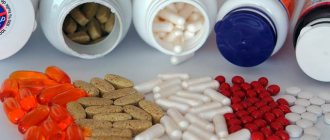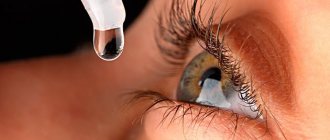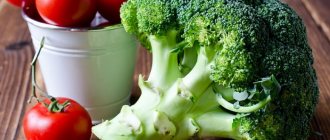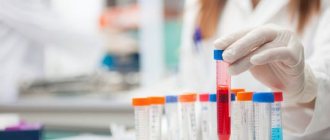Information about the importance of vitamins accompanies us everywhere: the radio in the car, leaflets on public transport, advertising on TV and advice from friends. Pharmacy shelves are full of multivitamin complexes. And only cancer patients do not share our optimism regarding their “life-giving” power, reasoning like this: if vitamins stimulate metabolic processes, then this is true for all cells of the body, including malignant ones: “if I don’t take them, there will be no tumor growth.”
Currently, a lot of scientific research is aimed at studying how vitamins affect cancer. The results are still contradictory, but there are interesting data that make us think seriously about this.
Why do people need vitamins?
These are vital substances for humans, most of which are not synthesized in the body or in insufficient quantities. Their source is food of plant and animal origin. They are not stored and are neither a building material nor a source of energy for cells. They play the role of a catalyst in the body, accelerating and increasing the efficiency of biochemical reactions, the stability of the immune system, and participate in the metabolism of proteins, carbohydrates and fats. Some of them (C, E, A) are natural antioxidants.
Each of the vitamins has a wide spectrum of action, but at the same time has a number of characteristic properties unique to it. Therefore, it will not be possible to replace one with the other. Our body needs all 13 vitamins for normal functioning: 9 water-soluble (B1, B2, B3, B5, B6, B7, B9, B12, C) and 4 fat-soluble (A, D, E, K). The absence, insufficient amount or excess of any vitamin in food is always accompanied by a disorder in the corresponding area of metabolism and is manifested by certain clinical symptoms.
Daily vitamin requirements for adults
| Water soluble | Daily value for adults | |
| B1 (thiamine) | 1.5 mg | |
| B2 (riboflavin) | 2.0 mg | |
| B3 (niacin) | 20 mg | |
| B5 (pantothenic acid) | 5 mg | |
| B6 (pyridoxine) | 2 mg | |
| B7 (biotin) | 50 mcg | |
| B9 (folic acid) | 400 mcg | |
| B12 (cyanocobalamin) | 2.4 mcg | |
| C (ascorbic acid) | 90 mg | |
| Fat soluble | men | women |
| A (retinol) | 900 mcg (3000 IU) | 700 mcg (2333 IU) |
| D (cholecalciferol) | Age 19-70 years – 15 mcg (600 IU) Age > 70 years – 20 mcg (800 IU) | |
| E (tocopherol) | 15 mg | |
| TO | 120 mcg | |
What vitamins are contraindicated for cancer?
When considering the question of whether vitamins can be taken for oncology, it is important to note that not all such substances have an exclusively positive effect on the body. Some of them can promote tumor growth and are therefore strictly contraindicated. These vitamins include:
- tocopherol in capsules;
- B12 (methylcobalamin);
- thiamine;
- B9 (folic acid).
The patient is also not recommended to take iron-containing medications. Smokers need to be careful with vitamin A, as it negatively affects the body in case of lung cancer. In case of bladder or prostate cancer, uncontrolled intake of vitamins A, E and D3 is dangerous.
Do patients with cancer need vitamins?
All people need vitamins, regardless of gender, age and the presence of diseases, in quantities corresponding to the daily requirement to ensure the normal functioning of metabolic processes in the body. It must be remembered that healthy people, provided they have a balanced diet, do not benefit from any additional substances.
Courses of radiation therapy and the use of cytostatic drugs are accompanied by a sharp decrease in immunity and intoxication. Regular nutrition does not always provide the body with the optimal amount of nutrients. This is especially true for patients with gastrointestinal pathology and side effects of cancer treatment. The decision on the need to increase the dose or on an additional prescription of a multivitamin complex is made by the doctor, based on the results of a clinical and laboratory examination.
Allowed foods for kidney cancer
Kidney cancer obliges every patient to eat properly, eat light foods rich in vitamins and beneficial microelements. It is important to include more fruits and vegetables in your menu. They are rich in nutrients and normalize intestinal function. They are eaten fresh, boiled, steamed and mixed into salads. It is better to boil potatoes in their skins or bake them.
Cancer patients are recommended to eat lean meat and fish. Vegetables or porridge are prepared as a side dish. Instead of white bread, you should eat grain or black bread, and you should not eat baked goods at all.
Sour cream promotes better absorption of plant foods. It is used to dress salads and add to soup, but no more than a tablespoon. If you have kidney cancer, you can include fermented milk products in your diet.
Recommended topic:
Treatment of angiomyolipoma of the kidney
Foods that slow down the development of kidney cancer
In case of kidney cancer, not only complex medications help, but also regular food. Numerous studies have shown that certain foods strengthen the immune system, improve overall well-being, fight depression, and most importantly, prevent the growth of cancer cells. The most useful include:
- soy - inhibits the growth of malignant tumors, removes toxins after radiation therapy; phytoestrogens and isoflavones are endowed with antitumor properties;
- brown algae - products improve the functioning of the thyroid gland and act as an antioxidant;
- garlic – removes toxins from the body, activates white blood cells that kill cancer cells;
- pomegranate – the product prevents the spread of cancer cells in the patient’s body;
- fruit seeds, nuts - they contain substances that contribute to the active fight against cancer cells;
- tomatoes – have antitumor, antioxidant properties;
- broccoli – kills cancer stem cells;
- eggs, fish (especially flounder) - foods are rich in omega-3 fatty acids, which stop the growth of cancer cells.
Turmeric
You can add ginger and turmeric to prepared dishes. These healthy seasonings are endowed with anti-cancer properties. Beetroot juice has proven itself well in the treatment of kidney cancer. The product dulls pain, stops the growth of cancer, increases the oxidation of pathogenic cells, and normalizes hemoglobin.
Products with anti-carcinogenic effect
During the treatment of kidney cancer and for the purpose of its prevention, it is necessary to eat foods rich in fiber, vitamins C, E, provitamin A, and phytochemical elements. All these components have an anti-carcinogenic effect. The undisputed leadership in this issue belongs to green tea, fruits, and vegetables. In addition, the following products have anti-carcinogenic properties:
- cabbage family;
- kiwi;
- parsley;
- citrus;
- grape;
- guava;
- carrot;
- Rose hip;
- Bell pepper;
- green onions;
- pumpkin;
- wheat germ.
B vitamins
B 1 (thiamine) regulates protein and carbohydrate metabolism, supports the normal functioning of the central and peripheral nervous system, digestive and endocrine systems. Thiamine deficiency leads to the development of beriberi disease, the symptoms of which are anorexia, weight loss, cognitive impairment (decreased cognition, attention), muscle weakness and cardiomegaly.
In 2021, it was found that thiamine (B1) deficiency was found in 55.3% of cancer patients who were referred for psychiatric consultation for any reason. At the same time, thiamine deficiency was detected even while taking the appropriate complexes. Isenberg-Grzeda E., Sneb MJ, Alici Y., Wills J. et al. High rate of thiamine deficiency among inpatients with cancer referred for psychiatric consultation: results of a single site prevalence study. Psychooncology. 2021. 26(9): 1384-13-89.
In a study published in 2021, Japanese scientists found that patients with gastrointestinal cancer receiving chemotherapy and having adverse neurological manifestations also had reduced levels of B1 in the blood. Iimura Y., Kurokawa T., Nojima M., Kanemoto Y. et al. Potential thiamine deficiency and neurological symptoms in patients receiving chemotherapy for gastrointestinal cancer. Int. J. Pharmacol. Ther. 2021. doi: 10.5414/CP203602.
B 2 (riboflavin) ensures the normal course of redox processes, participates in the metabolism of fats, proteins and carbohydrates, promotes the absorption of iron and B6, is necessary for the formation of red blood cells and antibodies, supports the normal functioning of the nervous system, plays an important role in the processes of cell growth and repair and tissues, improves visual acuity. Riboflavin (B2) deficiency leads to stomatitis, glossitis, seborrheic dermatitis, photophobia, and anemia.
The scientific medical literature mentions that the consumption of riboflavin (B2) does not have a significant effect on the risk of developing breast cancer or the incidence of colorectal cancer.
Yu L., Tan Y., Zhu L. Dietary vitamin B2 intake and breast cancer risk: a systematic review and meta-analysis. 2021. 295(3): 721-729. doi:10.1007/s00404-016-4278-4.
Yoon YS, Jung S, Zhzng X, Ogino S et al. Vitamin B2 intake and colorectal cancer risk; results from the Nurses' Health Study and the Health Professionals Follow-Up Study cohort. 2021. 139(5): 996-1008. doi: 10.1002/ijc.30141.
B 3 (niacin, nicotinic acid) is involved in cellular metabolism, signal transmission between cells and restoration of DNA structure. B3 deficiency is manifested by fatigue, depression, memory loss, headaches, and skin problems.
Research by Canadian scientists has confirmed that niacin (B3) helps repair DNA damage caused by ultraviolet radiation, reducing the risk of developing skin cancer.
Nazarali S., Kusel P. Vitamin B Derivative (Nicotinamide) Appears to Reduce Skin Cancer Risk. 2021. 22(5): 1-4.
In 2021, Australian scientists found that excess B3 increases the risk of developing stomach cancer.
Dugue PA, Bassett JK, Brinkman MT, Southey MC et al. Dietary Intake of Nutrients Involved in One-Carbon Metabolism and Risk of Gastric Cancer: A Prospective Study. 2021. 71(4): 605-614. doi: 10.1080/01635581.2019.1577982.
B 5 (pantothenic acid) is involved in carbohydrate and fat metabolism. In combination with vitamin C, it promotes wound healing. Deficiency is extremely rare and is manifested by fatigue, apathy, general weakness, sleep disturbance, nausea, and vomiting.
B 6 (pyridoxine) regulates the metabolism and synthesis of proteins, carbohydrates, and fats. Necessary for the normal functioning of the nervous system. Deficiency leads to seborrheic dermatitis, anemia, neurological and mental disorders.
A number of independent studies have found that adequate dietary intake of B6 reduces the risk of colorectal cancer, gastrointestinal carcinomas, and breast cancer, especially for postmenopausal women.
Mocellin S., Briarava M., Pilati P. Vitamin B6 and cancer risk: a field synopsis and meta-analysis. J. Natl. Cancer Inst. 2021. 109(3): 1-9. doi: 10.1093/jnci/djw230.
Wu W., Kang S., Zhang D. Association of vitamin B6, vitamin B12 and methionine with risk of breast cancer: a dose-response meta-analysis. Br. J. Cancer. 2013. 109(7): 1926-44. doi: 10.1038/bjc.2013.438.
Bird RP The Emerging Role of Vitamin B6 in Inflammation and Carcinogenesis. Adv. Food Nutr. Res. 2021. 83: 151-194. doi: 10.1016/bs.afnr.2017.11.004.
B 7 (biotin) plays an important role in the metabolism of glucose, amino acids, and fatty acids. Deficiency is rare and is manifested by hair loss, fatigue, mood swings, depression, and sometimes neurological disorders. Partially synthesized by intestinal microflora.
B 9 (folic acid) is involved in the processes of biosynthesis of protein, DNA and RNA, is of particular importance for the growth, development and differentiation of cells and tissues that have a high turnover rate (hematopoiesis, gastrointestinal mucosa), and helps normalize fat metabolism.
American scientists have found that excess consumption of folic acid in healthy people can lead to an increased risk of cancer and disease progression in people with precancerous lesions. However, folic acid intake within the physiological requirement range is associated with a reduced risk of cancer in a population of healthy people.
Weiβenborn A., Ehlers A., Hirsch-Ernst KI, Lampen A., Niemann B. A two-faced vitamin: Folic acid—prevention or promotion of colon cancer? Bundesgesundheitsblatt Gesundheitsforschung Gesundheitsschutz. 2021. 60(3):332-340. doi:10.1007/s00103-016-2505-6.
Yan S., Huang Q., Chen J., Song X. et al. Tumor-targeting photodynamic therapy based on folate-modified polydopamine nanoparticles. Int. J. Nanomedicine. 2021. 14:6799-6812. doi: 10.2147/IJN.S216194.
B 12 (cyanocobalamin) is involved in the processes of protein biosynthesis, DNA and RNA, and cell division. Deficiency occurs, as a rule, in people who have undergone extensive gastric surgery or suffer from various gastrointestinal diseases, and is manifested by anemia, paresthesia and other neurological symptoms.
Norwegian researchers found that patients with coronary heart disease who received supplemental folic acid and B12 had increased incidence and mortality from lung cancer.
Ebbing M., Bonaa KH, Nygard O., Arnesen E. et al. Cancer incidence and mortality after treatment with folic acid and vitamin B12. 2009. 302(19): 2119-26. doi: 10.1001/jama.2009.1622.
A recent meta-analysis conducted at Zhengzhou University Hospital (China) confirmed that adequate intake of vitamins B1, B3, B6 and B9 reduced the risk of developing esophageal cancer, while excessive intake of B12, on the contrary, increased the risk of developing esophageal cancer.
Ma JL, Zhao Y, Guo CY, Hu HT et al. Dietary vitamin B intake and the risk of esophageal cancer: a meta-analysis. 2021. 10: 5395-5410. doi: 10.2147/CMAR.S168413.
C (ascorbic acid) is a powerful antioxidant, regulates the absorption, transport and storage of iron, has detoxifying properties, supports the production of antibodies and the functioning of leukocytes.
Scientific research confirms that vitamins C, D and E help reduce the side effects that occur during chemotherapy and radiation therapy for lung, stomach, prostate, neck and colorectal cancer. Being antioxidants, they protect healthy cells from mutations and damage, destroy free radicals, promote the death of cancer cells, inhibit the formation of new blood vessels in the tumor and reduce metastasis.
Jain A., Tiwari A., Verma A., Jain SK Vitamins for Cancer Prevention and Treatment: An Insight. 2017; 17(5): 321-340. doi: 10.2174/1566524018666171205113329.
A (retinol) ensures growth, development and differentiation of tissues, barrier function of the skin and mucous membranes, visual acuity, and stimulates protein synthesis. Being a strong antioxidant, it helps restore damaged cells and heal wounds.
Studies have confirmed that retinol (A) and its preparations alleviate the course of certain types of cancer in the prostate, breast, pancreas, and gall bladder.
Davis-Yadley AH, Malafa MP Vitamins in pancreatic cancer: a review of underlying mechanisms and future applications. Adv. Nutr. 2015. 6(6): 774-802. doi: 10.3945/an.115.009456.
D (cholecalciferol) accelerates the absorption of calcium and phosphorus in the intestine, ensures bone mineralization, and regulates calcium transport. Necessary for restoring calcium metabolism, which is disrupted during chemotherapy and hormonal therapy for cancer. Activates cellular immunity.
K (“antihemorrhagic”) plays a significant role in the process of blood clotting, is involved in metabolism in bones (absorption and interaction of calcium with vitamin D) and connective tissue. With a deficiency, hemorrhages, bleeding gums, nosebleeds, and gastrointestinal bleeding appear.
E (tocopherol) is a powerful antioxidant, promotes the accumulation of glycogen in muscle tissue, and slows down aging.
The results of a multicenter study (35,533 men) conducted on the basis of 427 medical centers in the United States, Canada and Puerto Rico demonstrated that dietary supplements with vitamin E and selenium increased the risk of developing prostate cancer in healthy men.
Klein EA, Thompson IM Jr., Tangen CM, Crowley JJ et al. Vitamin E and the risk of prostate cancer: the Selenium and Vitamin E Cancer Prevention Trial (SELECT). 2011. 306(14): 1549-56. doi: 10.1001/jama.2011.1437.
Recent research suggests that the reason for these disappointing results is the form that was used in dietary supplements (α-tocopherol). Other forms of it (δ-tocopherol, γ-tocopherol, etc.) demonstrate greater effectiveness for cancer prevention.
Davis-Yadley AH, Malafa MP Vitamins in pancreatic cancer: a review of underlying mechanisms and future applications. Adv. Nutr. 2015. 6(6): 774-802. doi: 10.3945/an.115.009456.
What vitamins can you take if you have cancer?
As already mentioned, some groups of vitamins require a special approach and careful intake due to their properties. This mainly concerns the fat or water solubility of vitamins, if individual intolerance to the substance is excluded.
Thus, water-soluble vitamins, such as vitamin C or B6, practically do not cause hypervitaminosis, since excess of these substances is excreted in the urine. This does not mean that they can be taken in unlimited quantities, however, the doses and precautions of administration are much more tolerable than with fat-soluble ones.
Vitamin A
The chemical name is retinol. It is important for the human body in combination with the antioxidant beta-carotene, which is a precursor of retinol in the chemical cascade. The well-known beneficial effect of vitamin A is that it has a beneficial effect on the condition of the skin, nails and hair.
However, for cancer patients, this substance has a different meaning - retinol improves the composition of blood plasma and helps fight anemia, which often accompanies cancer. This vitamin is found in eggs, carrots, liver, broccoli and lettuce.
Vitamin preparations based on retinol should be taken with caution, as mentioned above, it is fat soluble and is metabolized in the liver. In this regard, taking it can put unnecessary stress on the liver, which in case of cancer is already quite loaded with a large number of drugs.
B vitamins
In oncology, B vitamins play a decisive role in the fight of immune cells against tumors, optimize metabolism in bone and muscle tissue and help cope with a lack of platelets in the blood.
They are water-soluble vitamins, so they can almost always be taken without fear, both in the form of certain products and with vitamin complexes from pharmacies. Vitamin B1 or thiamine is found in rye bread, eggs, sprouted wheat, honey pollen and oats. It strengthens the hematopoietic system and generally has a positive effect on the state of blood plasma.
Vitamin B6 in oncology (pyridoxine) is involved in many enzyme cycles in the liver and is a natural filter that helps get rid of toxins and harmful substances. It also has a beneficial effect on the condition of nerve cells, which is why it is so important in the rehabilitation of patients after neurosurgical operations. Contained in seaweed, celery and liver.
Vitamin B12 or cyanocobalamin is a strong antioxidant that binds free radicals that damage cells. Therefore, this vitamin is very important in the comprehensive fight against cancer. Contained in apples, liver, beets.
Do not underestimate how much b vitamins in oncology help the patient strengthen the immune system and mobilize the body’s strength to fight cancer. That is why oncologists at clinics so often prescribe B-complexes for concomitant treatment of cancer patients.
Vitamin C
Ascorbic acid is widely known for its immunostimulating effect, but for cancer patients, vitamin C is not limited to this effect. In addition to enhancing the immune response and promoting the production of antibodies (immunoglobulins), ascorbic acid strengthens the blood vessels of the brain and tones the general condition of the patient.
This effect is especially relevant in patients whose disease is accompanied by cancer cachexia or asthenia, or exhaustion after courses of chemotherapy.
A lot of ascorbic acid is found in rose hips, hawthorn, and citrus fruits.
The vitamin is also water soluble, so you rarely have to worry about overdosing.
Vitamin E
Vitamin E or tocopherol is a fat-soluble vitamin that is a powerful natural antioxidant. In addition to its fight against free radicals, tocopherol generally improves the rheological properties of the blood, prevents thrombosis of blood vessels and destruction of blood cells, and increases the level of proteins in the blood. It is also called the vitamin of youth and health.
Vitamin E is found in fish oil, liver, sea fish and eggs. In the form of a medicine, tocopherol should be taken in small doses, since an individual reaction of intolerance or hypervitaminosis is possible. Vitamin E for oncology is prescribed as an adjuvant in the case of treatment of bone tumors in Israel or thyroid gland.
Nutrition for cancer patients
It is recommended to eat nutritious and balanced food. But, unfortunately, this is not always the case. You must be extremely careful when purchasing multivitamin complexes and dietary supplements on your own, since their composition can differ dramatically. For example, in 2021, a rather interesting study was conducted in the USA, during which they took the 50 most popular complexes and compared their composition. The data obtained showed a range in the content of individual vitamins and minerals from 24% to 57% of the daily requirement for humans! Now you understand why it is so important to read the instructions carefully.
If, due to the characteristics of the disease and side effects from the treatment, you are malnourished, losing weight, or becoming weaker, then you need to think about changing your diet and consult with your doctor about the need to additionally replenish the missing nutrients and vitamins. The optimal solution may also be to use specially developed mixtures for enteral nutrition that are balanced in their composition, including the content of vitamins.
Subscribe to our Facebook groups and stay up to date with the latest news ! Only interesting videos on our YouTube , join us
Nutrition for patients with kidney cancer
A properly selected diet is the main component of successfully fighting kidney cancer. During illness, much more energy is expended than in normal conditions, so the body needs high-calorie food that will protect the patient from exhaustion and vitamin deficiency.
Pathology affects and disrupts almost all physiological processes. Following a diet with a kidney tumor is very important in order to maintain balance in the body’s activities and help it get rid of harmful metabolic products. The basis of a healthy diet for kidney cancer lies in a few simple rules:
- There is little, but often. You need to eat 6-7 times a day, chewing your food thoroughly. Portions should be small, within 200 grams. Overeating can lead to bloating and other gastrointestinal problems.
- Eat only freshly prepared food. Make sure that food that has been in the refrigerator for more than 12 hours does not enter your stomach. Limit the consumption of cold and hot, the dish should be warm.
- Cook correctly. When subjecting products to heat treatment, preference should be given to gentle methods: boiling, cooking in the oven, steaming. If you have kidney cancer, fried foods are prohibited; they accumulate a huge amount of carcinogens. Fish, like meat, needs to be ground into minced meat and put into soufflés, casseroles or steamed cutlets. In this form they are easier to digest.
- Monitor the amount of fluid entering the body. Of course, the more a person drinks, the faster toxins are eliminated. But with kidney cancer, it is important not to overload the organ further. The daily dose is agreed upon with the attending physician. If a patient suffers from indigestion or vomiting, he loses a lot of fluid, so it is recommended to drink at least three liters of still clean water per day.
The diet plan for a patient with kidney cancer should include foods with minimal salt content. Its consumption rate is 5 g per day. The dish is not salted during the cooking process, but you can season the finished dish a little. It is advisable to exclude this flavoring additive from the diet.
If the condition of a patient with kidney cancer worsens and disturbances in the gastrointestinal tract appear, the diet is adjusted based on the problem. For example, during severe diarrhea, reduce the consumption of foods that have a laxative effect (fruits, herbs, vegetables). Fiber-rich foods can help relieve constipation. If the patient has difficulty swallowing or chewing, prepare soft and liquid foods (soups, purees, soufflés).
Ratio of proteins, fats and carbohydrates
An important point when choosing a diet for a patient with kidney cancer is maintaining a balance of fats, carbohydrates, and proteins. Their correct ratio is 1:4:1. On average, thermal energy consumption per day is 3 thousand calories.
Protein should make up no more than 15% of your daily calorie intake. If we take into account that 4.1 calories are released from 1 gram, then the daily norm for kidney cancer is 100 g. All protein products are conventionally divided into four groups:
Recommended topic:
Bladder tumors
- Protein up to 3% - sugar, tomato, peach, Jerusalem artichoke, eggplant, raspberries, strawberries, green peas, green beans, potatoes, honey, figs, grapes, orange, cucumber, dates, pineapple, leeks, cauliflower and kohlrabi, butter, vegetable oil.
- Protein within 3–10% - oats, barley, wheat, corn, vermicelli, millet, milk, chocolate, rice, flour products.
- Protein within 10–15% – eggs, almonds, feta cheese, condensed milk, pork belly, walnuts.
- Protein more than 15% - lentils, pork, beans, fish, lamb, cheeses, poultry, peas, beef, crabs, crayfish.
- Animal protein saturates the body with amino acids. Cancer patients should consume it 30–40% of the total amount of protein food.
Vegetable fats
Fats for malignant kidney tumors should be limited to 80 g per day. Of these, 60% should be animal fats, and the rest should be vegetable fats.
Primacy in the menu of a patient with kidney cancer is given to plant foods, the main source of carbohydrates. These are berries, fruits, cereals, vegetables, bread. Sugar consumption is limited to 20% of total carbohydrates.








